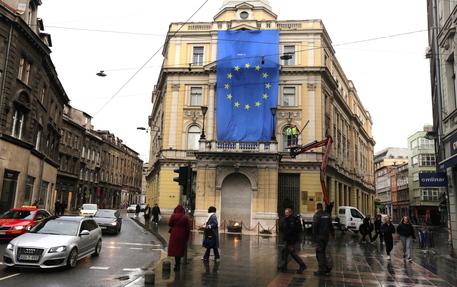(ANSA) - ROME, DEC 16 - Almost seven years after submitting a
formal application for EU membership, Bosnia and Herzegovina
finally received the unanimous support of 27 EU heads of state
and government to join the bloc. But now the Western Balkan
country of 3.3 million people must deliver reforms.
CLEAR MESSAGE.
After years of standstill, Russia's war on Ukraine has breathed
fresh life into the EU's willingness to consider welcoming more
of its eastern neighbors to its ranks. The Member States agreed
on December 15 to grant Bosnia and Herzegovina (BiH) "candidate
status" to join the union, putting the volatile Balkan nation at
the start of a long road to membership. A recommendation to this
effect was made by the European ministers of the EU states in
Brussels on Tuesday. One of the reasons for this move are
concerns that the country, which has a population of around 3.3
million, could otherwise increasingly orient itself towards
Russia or China.
In the wake of the decisions to grant candidate status to
Ukraine and Moldova in June 2022, EU member states such as
Austria and Slovenia in particular had urged the EU to also
grant candidate status to Bosnia and Herzegovina. The fact that
BiH was once again ignored in this process caused great
disappointment in the country. It was offered the prospect of EU
accession as early as 2003, and in 2016 officially submitted an
application for membership.
European Commissioner for Neighbourhood and Enlargement Olivér
Várhelyi said that the Council's decision was sending a very
clear message to the citizens of BiH that the EU stands by the
country. He added that it was now necessary for BiH to show its
readiness to fulfill the conditions set earlier, "Europe
delivers and now we want to see Bosnia and Herzegovina deliver
as well." The conditions mentioned by Commissioner Várhelyi are
14 key reforms that the European Commission put before BiH back
in May 2019. They concern reforms in several areas, including
democracy, the rule of law and public administration.
Political commentators in Bosnia and Herzegovina believe that
the EU should have granted Bosnia and Herzegovina candidate
status at the same time as the majority of other countries in
the Western Balkans. This could have helped to facilitate the
resolution of numerous internal problems in the country. For
example, the government of the Republika Srpska entity maintains
close economic and political ties with Moscow, and the absence
of candidate status for EU membership only favored the growth of
Russian influence.
EU CANDIDATE STATUS FOR BIH BENEFITS BOTH PARTIES.
Ahead of the vote at an EU summit on December 15, Latvian Prime
Minister Krišjānis Kariņš said the decision was "mutually
beneficial to both the Western Balkans and the European Union as
a whole." "The European Union has a geopolitical interest in the
Balkans," he added.
EU High Representative for Foreign Affairs and Security Policy
Josep Borrell said on the sidelines of the EU summit, "It is a
good occasion for the leadership of Bosnia and Herzegovina to
push for the reforms. This is the occasion for the country to
really embark on the European path. It's a very important step
for Bosnia Herzegovina and for the whole region."
Due to the ongoing political crisis in Bosnia and Herzegovina,
little has been done so far to implement the set conditions. All
public opinion surveys show that membership in the EU is one of
the rare goals strongly supported by all three nationalities and
throughout BiH. All the parliamentary parties in Bosnia and
Herzegovina that are participating in the negotiations on
forming a government after the elections in October have put the
continuation of the European path high on their list of
priorities, regardless of the fact that no one knows how long
the journey will take.
(continues)
This article was produced with contributions from AFP, dpa,
FENA and STA as part of the European Newsroom (enr) project
(ANSA).
Bosnia and Herzegovina takes another step to EU accession
Western Balkan country must deliver reforms to join the bloc
